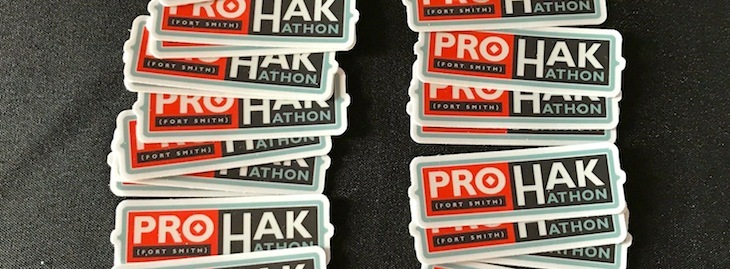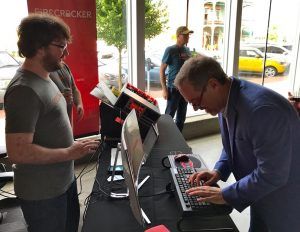Inaugural ‘ProHak’ unveils new charity, password cracking softwares
by May 12, 2017 6:47 am 1,250 views

Propak’s first annual “ProHak” hackathon event concluded Thursday night (May 11) with demonstrations from three teams from the company’s information technology (IT) departments. Projects included community food services, different ways to give, and a password guessing program.
The closing event was held in the Friedman-Mincer building in downtown Fort Smith that now serves as Propak’s corporate headquarters.
Propak Founder and CEO Steve Clark said, “From time to time, this company gets asked to donate to a variety of charities, which is wonderful. Much is given, much is expected, and I’m humbled to be able to assist. But there’s a different way to do it as well, and that is for our local corporations to provide access to resources — resources that can be utilized to better enhance the efficiency and quality of our local charitable organizations.”
Team One built a fob, mobile app, and computer interface charitable organizations could use to instantly identify food shortages, compile relief packages, and dispatch a driver for delivery. Team Two built a user interface in support of the Champions for Kids nonprofit that allows citizens unsure of how to use their talents, abilities, and resources, a matchmaking portal for doing so. Under the system, a citizen looking to give back could tell the computer how they wished to give — personally, professionally, or through a corporate donation. If giving of their ability, the user could list skills and talents, which the computer would then use to find local schools and organizations aligned with the user profile.
Team Three’s program — a non-Internet-connected password guessing hardware/software hybrid called Firecracker — was less about charity and more about cyber security and entertaining guests. Attendees enthusiastically fed the system around 180 passwords. Firecracker would then compare the passwords to various word lists obtained from recent breaches of well-known companies. The one-hour test conducted trillions of guesses and achieved an accuracy rating of around 50%, with two users bragging to Talk Business & Politics Firecracker had texted them its success 28 and 48 seconds into the search.
Clark credited all developers involved in making the hackathon event a reality, noting they had created their visions while maintaining Propak’s day-to-day technology needs, which includes building code, software, and warehouse management systems as well as systems for transportation, inventory control, and accounting.
“They’re building the infrastructure for the corporation. What we would do (to make ProHak work) is set up a rotating help desk. While we had the bulk of the organization working on this, they would take turns and let the whole company know that for the next 48 hours, we’re not building, we’re maintaining while building this over here.”

Clark said he hoped ProHak was “the first of many, many things business owners around town can use their creative energies, their resources, on to bring new thoughts and ideas to our community.”
“We (as a community) are worthy. We are capable. And from my perspective, while we may not be able to match financial resources with other areas, we can always match our creativity with initiatives, vision, and hard work. We can do those things better than most,” Clark said.
Clark told Talk Business & Politics after the event his vision for the individual programs — which each took only 48 hours to build from the ground up — was that they would “take on a life of their own.”
“It’s not realistic to think that everything will be a wild success,” Clark said. “We’ll take what seems to be working, and we’ll build upon it. We’ll get with our charitable partners, and see what needs to be added and any additional construction that we can do to make it a legitimate, viable product.”
Over the 48-hour timeline, Clark said, his teams had brought their ideas into a “working beta” as in keeping with the spirit of a hackathon, which traditionally demonstrates a company’s technical and development prowess, building a product from idea to functional prototype in a condensed timeframe.
“Once we decide something is sustainable, then we will build out the balance of the software to better serve the community-at-large. But this is really, as much as anything, an introduction. An introduction of services, an introduction of resources, and encouragement to the community to maybe consider things they haven’t considered before and to see that there really can be a cooperation between private corporations and public needs,” Clark said, adding that it’s a glimpse that “allows any number of people from all cross-sections of the city to come together via technology to dream and to take this sense of what could be back to wherever they’re from and hopefully apply it to their situations, and we’ll see what grows from the little seed that’s planted.”
